turkey

Technology / 3 weeks ago
The highest helicopter exporting countries in the world
Global defence spending is rising, and as countries modernise their aviation fleets, the international market for helicopters, both military and civilian, is becoming more competitive than ever. Global defence spending is rising, and as countries modernise their aviation fleets, the international market for helicopters, both military and civilian, is becoming more competitive than ever. The latest data from World’s Top Exports shows a clear picture of which nations dominate this highly specialised industry, and why demand continues to grow.
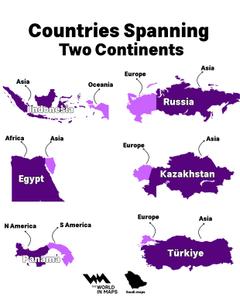
Maps / 3 weeks ago
Five countries that are situated on two continents
A handful of countries are uniquely positioned at the crossroads of continents. Five such nations, Indonesia, Russia, Egypt, Kazakhstan, Panama, and Türkiye, each straddle two continental regions. A handful of countries are uniquely positioned at the crossroads of continents. Five such nations, Indonesia, Russia, Egypt, Kazakhstan, Panama, and Türkiye, each straddle two continental regions. Indonesia, the world’s largest archipelago, stretches between Asia and Oceania, with the easternmost islands of Papua forming its easternmost reach. According to the CIA World Factbook, Indonesia encompasses over 17,000 islands, making its transcontinental footprint both vast and culturally diverse.
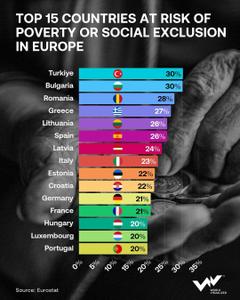
Business / 11 weeks ago
Parts of the EU risk poverty and social exclusion
Europe is widely seen as a basin of prosperity, with advanced economies, generous welfare systems, and high standards of living. Yet, in many European nations, nearly a third of the population faces poverty. The most recent data from Eurostat (2024) reveals stark disparities. Türkiye and Bulgaria top the list, with 30% of their populations facing poverty or social exclusion, followed closely by Romania (28%), Greece (27%), and Lithuania (26%).
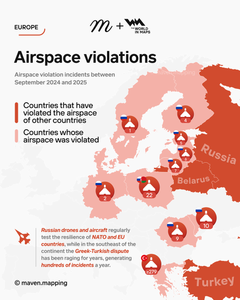
Maps / 13 weeks ago
Europe’s surge in airspace violations
Over the last year, European airspace has witnessed a startling rise in aerial attacks, many involving Russian aircraft and drones breaching the boundaries of NATO and EU nations. A new map plotting violations between September 2024 and 2025 starkly illustrates how Russia has taken the role of principal provocateur, regularly testing the resilience of allied air defences.
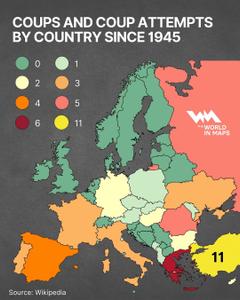
Politics / 13 weeks ago
Coups and coups attempts in Europe since 1945
Europe has long prided itself on political stability, especially when compared with other parts of the world. Since 1945, many nations across the continent have weathered revolutions, wars, social upheavals, but few outright coups or military takeovers. A map shows just how rare they have been: most European countries are shaded green (zero coups since 1945), with only a handful in brighter tones, indicating one, two or more attempts. The starkest outlier, Turkey, registers 11, more than any other European country on the map.
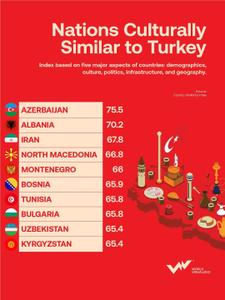
Culture / 13 weeks ago
Which nations are culturally closest to Turkey?
Turkey has long been seen as a country at the crossroads of continents, faiths, and trade routes, and a new Country Similarity Index shows just how unique yet interconnected it is. The index compares countries based on demographics, culture, politics, infrastructure, and geography, painting a nuanced picture of which nations most closely resemble Turkey’s social and institutional makeup.
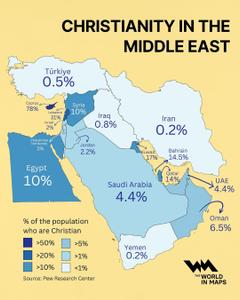
Culture / 18 weeks ago
Christianity in the Middle East: A minority faith with deep roots
Christianity was born in the Middle East nearly 2,000 years ago, yet today, Christians make up only a small minority across the region. According to data from the Pew Research Centre, the percentage of Christians varies widely by country, from a tiny fraction in places like Iran (0.2%) and Yemen (0.2%) to large communities in Lebanon (31%) and Cyprus (78%).
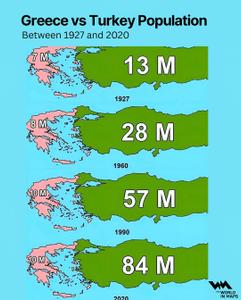
Maps / 29 weeks ago
How populations of Greece and Turkey have evolved between 1927 and 2020
Between 1927 and 2020, Greece and Turkey experienced markedly different population trends, reflecting their unique historical, political, and socio-economic developments. In 1927, Turkey's population stood at approximately 13.6 million. Over the subsequent decades, the country witnessed significant growth, reaching 83.6 million by 2020. This expansion was particularly rapid in the post-World War II era, with annual growth rates peaking at nearly 3% in the early 1960s.
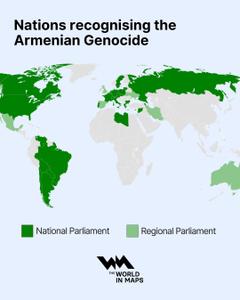
Politics / 35 weeks ago
Over 30 nations officially recognise the Armenian genocide
A growing number of countries have officially recognised the Armenian Genocide, marking a global shift in historical accountability and diplomatic transparency. According to the Armenian National Institute, more than 30 nations, primarily in Europe and the Americas, have passed resolutions through either national or regional parliaments acknowledging the 1915 mass killings of Armenians by the Ottoman Empire (Turkish Empire) as genocide.
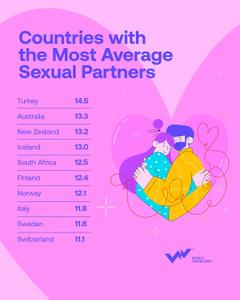
World / 37 weeks ago


